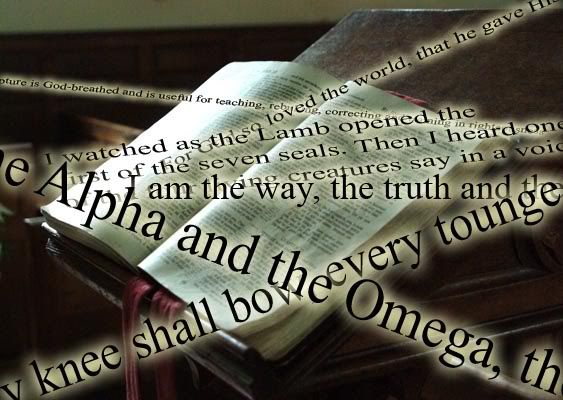
I get a quarterly christian magazine in the mail called "Ignite" that's aimed towards college students and the like, and in the Q & A section a girl writes:
"Why is there a hell if all sins are forgiven?"
Though the article is rather short, ill just type the part that "grinds my gears".
"[Hell]'s the place for people who want nothing to do with God. Heaven is not for anyone who doesn't want to spend eternity in Gods presence.
God offers each of us reconciliation and forgiveness...but if you spent your whole life ignoring or avoiding life with God, he's not going to compel you to live with him."
And the more Christians I talk to the more I get this type of "they just don't want God" rationalization. They appear to assume that everyone in this life that is not "saved", is simply walking around on earth, holding their "fingers in their ears" and whistling away while they live their sinful lives.
And all the while God supposedly keeps peeking in the door and saying
"Hey uh...wanna come hang out? I got some free tickets to eternal paradise, its pretty much the coolest thing ever". And the unsaved sinner replies
"WHAT? I CANT HEAR YOU!!! I'M TOO BUSY SINNING MY LIFE AWAY! LALALALA".
And quite possibly there are people like that in a sense. There are those people that know in full (well, they think they do) what a life in God through Christ entails, and they claim that they "wanna just live their own way". I'm not debating that mentality. There are also many times where its as though(and this has been true in my life) God has to run over, pile drive you to the ground and "pull the fingers out of your ears" to get your attention. If it wasn't for God doing that I think my months of questioning and struggles would have left me a very depressed agnostic/atheist the rest of my life. If it wasn't for that I don't think I would have ever given my life to Him to begin with. That's just apart of life because of the sinful nature that gets in the way.
But my argument is not that. My argument is the misconception that everyone who isn't "saved" in this life by stumbling upon the "right" things to believe, automatically doesn't want anything to do with God. I don't think anything could be further from the truth. The reason why people "reject" God in this life is either because they haven't heard of Him at all or they don't understand Him for who he really is(and really who can FULLY understand/experience Him til we are with him in eternity)? There are those who just "don't accept him" but they don't accept him because they don't really believe, and they don't really believe because they don't see how it could be true, and they don't see how it could be true because their sin, circumstances and the Devil himself are holding them and blinding them from whom God really is. From the love and forgiveness that he wants us all to have though His son who died on the cross.
I'm tired of this rationalization that choosing heaven over "hell" is this clear cut physical given choice that everyone MUST make. Its not as if theres a celestial airport that every human passes through when they are born. And the two destinations for that airport God announces over the intercom:
"Okay everybody, we have two flight destinations today. We have eternal paradise in Heaven with me, Lord God Almighty your loving creator...and then we have eternal torture in Hell, featuring Satan and billions of burning, screaming people who will choke and die til the end of time. Thank you for flying God Airlines!"
What type of insane person, fully believing and understanding.... would choose "Hell" (at least the mainstream conception of it) over God? its not that clear, its not that simple. Yet the entire christian community, including myself for many years has bought this lie of "people had a clear choice and they just didn't want God" hook-line-and-sinker, to just simply "pass off" any feelings of empathy for those poor hell bound sinners when they die. After all...they made their "choice"
...right?
But its that very kind of rationalization that shuts off the brain from probing what verses really mean. Its that rationalization that says "well that's just the way things are, I don't need to question my understanding of it".
Its that rationalization that makes us like the supposed sinner in my first analogy, with the fingers in their ears, refusing to listen and avoiding the question out of fear. Its a filter made by fear and by Satan. And God did not give us a spirit of fear:
"Romans 8:15
15For you did not receive a spirit that makes you a slave again to fear, but you received the Spirit of sonship."
It doesn't even matter whether you fully believe in the doctrine of "eternal torture" or "ultimate reconciliation", because either way we need to look at the issue for what it really is and not just "rationalize it away". And I feel God has helped me stop rationalizing it away, and helped me lift off of me these types of falsehoods, to help see people for who they really are...His loving creations. Through that I have begun to have more love for others, more of a desire to tell them how to have a life in Christ and what He did for them. And to also think about their questions and fears in depth, as it is those very things that bar us from God. And I really just wish these types of rash generalizations/stereotypes/rationalizations would just dry up and never come back into the world of spiritual debates, because I really don't feel its helping us understand Gods true nature or his Love for people at all. God loves people deeper than "stumbling" across some beliefs, or making a "choice" in this life. While I believe those who don't accept God here on earth will still have to make a "choice" eventually...it'll be one before Him in all his glory at the end of ages, when people stand before him seeing him for how amazing he really is. It'll be an easy, clear cut choice...to be with their loving creator that they were made to be with.
...I believe everyone deep down needs and wants something to do with God, whether they realize it in this life or not.



